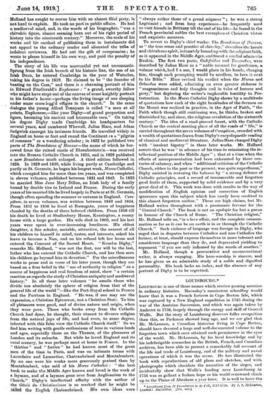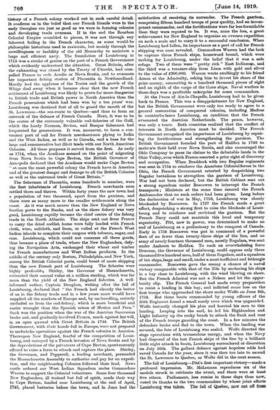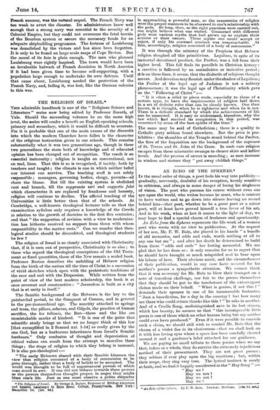LOUISBOURG.* LOIIMOURO is one of those names which receive passing
mention in ordinary histories. Macaulay's omniscient schoolboy would know that it was a French fortress in Cape Breton Isle, which was captured by a New England expedition in 1745 during the war of the Austrian Succession, and which was again taken by Amherst in 1758, largely through the energy and skill of General Wolfe. But the story of Louisbourg deserves fuller recognition than this, as Parkman showed long ago, and we are glad that Mr. McLennan, a Canadian historian living in Cape Breton, should have devoted a large and well-documented volume to the forgotten town which once attained such prominence in the eyes of the world. Mr. McLennan, by his local knowledge and by his indefatigable researches in the British, French, and Canadian archives, has been able to present a remarkably full account of the life and trade of Louiabourg, and of the military and naval operations of which it was the scene. He has illustrated the book with reproductions of old plans and sketches, and with photographs which elucidate the narrative of the sieges, and incidentally show that Wolfe's landing near Louiabourg in 1758 was as gallant a forlorn hope as his world-renowned climb up to the Plains of Abraham a year later. It is well to have the
• 14viebourg from Oa lopridation(site FM, 1713-17a. By J. O. NcLeanan. London; Macmillan. 125s. Batt
history of a French colony worked out in such careful detail It confirms us in the belief that our French friends were in the early Georgian era just as good as we were in forming colonies and developing trade overseas. If in the end the Bourbon Colonial Empire crumbled to pieces, it was not through any Inherent failing in the French character, as some would-be philosophic historians used to maintain, but mainly through the unwillingness or inability of the old Monarchy to maintain a largo and efficient navy. The foundation of Louisbourg in 1713 was a stroke of genius on the part of a French Government which evidently understood the situation. Great Britain, after the exhausting war closed by the Treaty of Utrecht, had com- pelled France to cede Acadia or Nova Scotia, and to evacuate her important fishing station of Placentia in Newfoundland. Hardly had the applause of the Tories' and the growls of the Whigs died away when it became clear that the new French settlement of Louisbourg was likely to prove far more dangerous to British trade and British power in North America than the French possessions which had been won by a ten years' war. Louisbourg was destined first of all to guard the mouth of the St. Lawrence—the sea-route to Quebec—and thus to form an outwork of the defence of French Canada. Next, it was to be the centre of the extremely valuable cod-fisheries of the Gulf, which the hardy Norman. Breton, and Basque fishermen had frequented for generations. It was, moreover, to form a con- venient port of call for French merchantmen plying to India and the West Indies, as well as to Canada, and a base for the large and remunerative but illicit taste with our North American Colonies. All these purposes it served from the first. As early as 1714, when the Acadians seemed on the point of migrating from Nova Scotia to Cape Breton, the British Governor of Annapolis declared that the Acadian!' would make Cape Breton " at once the moat powerful colony the French have in America and of the greatest danger and damage to all the British Colonies as well as the universal trade of Great Britain."
The fishermen of Placentia, some hundreda in number, were the first inhabitants of Louisbourg. French merchants soon settled there and throve. Within forty years the new town had a population of two thousand, apart from the garrison, and there were as many more in the smaller settlements along the coast. As it was much nearer than the New England or Nova Scotian ports to the Banks, and as the shore fishery WWI very good, Louisbourg rapidly became the chief centre of the fishing trade in the North Atlantic. The ships sent out from France to carry the dried codfish home were fully loaded with French cloth, wine, sailcloth, and linen, or called at the French West Indian islands to complete their cargoes with tobacco, sugar, and rum. Louiabourg, which could not consume all these goods, thus became a place of trade, where the New Englanders, defy- ing the Navigation Acts, exchanged their wheat and timber for French manufactures and West Indian products. In the middle of the century only Boston, Philadelphia, and New York, among the British Colonial ports, could boast of more shipping than the new French port of Louisbourg The fisheries were highly profitable. Shirley, the Governor of Massachusetts, estimated their annual value at a million steeling, which was far more than the yield of the New England fisheries. A well- informed author, Captain Douglass, writing after the fall of Louisbourg, declared that "the French had already the better of us in the fishery trade and in a few years more would have supplied all the markets of Europe and, by underselling, entirely excluded us from the cod-fishery, which is more beneficial and easier wrought than the Spanish mines of Mexico and Peru." Such was the position when the war of the Austrian Succession broke out, and gradually involved France, much against her will, in an open quarrel with Great Britain in 1744. The British Government, with their hands full in Europe, were not prepared to undertake operations against the French colonies in America. Thereupon New England, fearful of the competition of Louis- bourg, and annoyed by a French invasion of Nova Scotia and by the depredations of the privateers of Cape Breton, spontaneously offered to refs:, a force to attack and capture the place. Shirley, the Governor, and Pepperell, a leading merchant, persuaded the Massachusetts Assembly to authorize and pay for an expedi- tion, and the neighbouring Colonies followed their lead. New- castle ordered ow- West Indian Squadron under Commodore Warren to support the Colonial volunteers. Some four thousand New Englanders, ill trained but full of spirit, made their way to Cape Breton, landed near Louisbourg at the end of April,
1145, placed batteries before the town, and In June had the
satisfaction of receiving its surrender. The French garrison, comprising fifteen hundred troops of poor quality, had an incom- petent commander, and the fortifications were far less formidable than they were reputed to be. It was, none the less, a great achievement for New England to organize an ovensea expedition on such a scale and to carry it to a successful conclusion. When Louisbourg had fallen, its importance as a port of call for French shipping was soon revealed. Commodore Warren had the luck to capture three French ships, homeward bound, which were making for Louisbourg, under the belief that it was a safe refuge. Two of them were "pretty rich" East Indiamen, and the third was a treasure-ship from Lima with gold and silver to the value of £300,000. Warren wrote exultingly to his friend Anson at the Admiralty, asking him to invest his share of the prize-money, amounting to a hundred thousand pieces of eight and an eighth of the cargo of the three ships. Naval warfare in those days was a profitable enterprise for some commanders.
At the Peace of Aix-la-Chapelle, Louisbourg had to be given back to France. This was a disappointment for New England, but the British Government were only too ready to agree to a general restoration of conquered colonies, inoluding Madras to counterbalance Louisbourg, on condition that the French evacuated the Austrian Netherlands. The peace, however, was only a truce. Both countries realized that the conflict of interests in North America must be decided. The French Government recognized the importance of Louisbourg by repair- ing the fortification's and strengthening the garrison. The British Government founded the port of Halifax in 1749 to maintain their hold over Nova Scotia, and also encouraged the Ohio Company to press its claims to the debatable lands in the Ohio Valley, over which France asserted a prior right of discovery and occupation. When Braddock with two Regular regiments was sent in 1754 to reinforce the American Colonial forces in the Ohio, the French Government retorted by despatching two Regular battalions to strengthen the garrison of Louisbourg. War had not been declared, but the British Cabinet sent out a strong squadron under Boscawen to intercept the French transports ; Ministers at the same time fissured the French Ambassador that no such orders had been given. Long before the declaration of war in May, 1756, Louisbourg was closely blockaded by Boscawen. In 1757 the French made a great effort, despatching a strong fleet to raise the blockade of Louis- bourg and to reinforce and revictual the garrison. But the French Navy could not maintain this local and temporary superiority. Pitt, now in power, was determined to make an end of Louisbourg as a preliminary to the conquest of Canada. Early in 1758 Boscawen was put in command of a powerful fleet of no fewer than twenty-three ships of the line, and an army of nearly fourteen thousand men, mostly Regulars, was sent under Amherst to Halifax. To such an overwhelming force Drucour, the Governor of Louisbourg, could oppose only three thousand five hundred men, half of them Regulars, and a squadron of ten ships, large and small, under a most inefficient and lethargic commander. Boscawen gave the enemy a chance of a naval victory comparable with that of the Nile by anchoring his ships in a bay close to Loulabourg, with the wind blowing on shore. But the French Admiral was not a Nelson and let the oppor- tunity slip. The French General had made every preparation to resist a landing in this bay, and inflicted some loss on the first troops who approached the shore under Wolfe on June 8th, 1758. But three boats commanded by young officers of the 35th Regiment found a small sandy cove which wee upguardecL Wolfe instantly changed his plan and hurried his men to this landing. Leaping into the surf, he led his Highlanders and Light Infantry up the rocky beach to attack the flank and rear of the French troops guarding the coast. In a few minutes the defenders broke and fled to the town. When the landing was secured, the fate of Louisbourg was sealed. Wolfe directed the siege operations with tremendous energy, and when the Navy had disposed of the last French ships of the line by a brilliant little night attach in boats. Louisbourg surrendered at discretion on July 26th. The gallant defence against hopeless odds had saved Canada for the year, since it was then too late to ascend the St. Lawrence to Quebec, as Wolfe did in the next season.
The fall of Louisbourg—Pitt's first important viotory—made a profound impression. Mr. McLennan reproduces six of the medals struck to celebrate the event, and there were at least five others. Parliament, less remiss in those days than now, voted its thanks to the two commanders by whose joint efforts
Louiabourg was taken. The fall of Quebec, now out off foam
French euccour, was the natural sequel. The French Navy was too weak to avert the disaster. Its administrators knew well enough that a strong navy was essential to the security of a Colonial Empire, but they could not overcome the fatal inertia of the Bourbon system or secure the necessary funds for an adequate shipbuilding programme. The fortress of Louiabourg was demolished by the victors and has since been forgotten. It is only to be found on large-scale maps of Cape Breton. But the moral of its fate is plain enough. The men who planned Louisbourg were rightly inspired. The town would have been an invaluable bulwark of French dominion in North America If it had been given time to become self-supporting, with a population large enough to undertake its own defence. Until that came about, Louisbourg needed the protection of the French Navy, and, failing it, was lost, like the German colonies In this war.




































 Previous page
Previous page